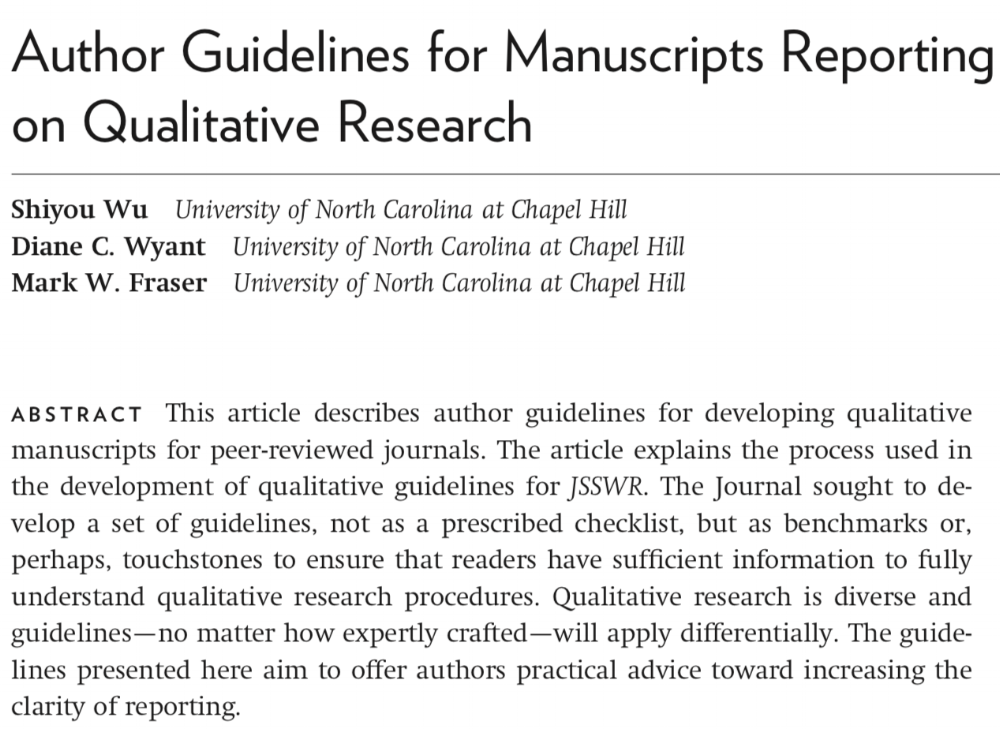Best Practices for Publishing Qualitative Social Work Research
Assistant Professor Shiyou Wu, School of Social Work, Arizona State University talks qualitative research with the SSWR Doctoral Student Task Force about his paper “Author Guidelines for Qualitative Research Manuscripts Submitted to JSSWR.”
By: Catherine Kramer, LMSW, MPA, School of Social Welfare, University at Albany – SUNY
As a doctoral student, Dr. Shiyou Wu worked with Dr. Mark Fraser, professor at the University of North Carolina, and former editor-in-chief for the Journal of the Society for Social Work Research. Wu and Fraser regularly reviewed article submissions to the journal, and noted an increasing amount of research utilizing qualitative methodologies. However, they found that, unlike the quantitative articles they reviewed, the quality and consistency of the qualitative submissions varied widely.
“On the quantitative side there is a fixed structure to follow – first the introduction, then methods and sampling section, followed by other prescribed sections – and everyone conforms to that structure and will report similar types of details used to assess the rigor of the work. However, on the qualitive side, there are all kinds of variations, so it is difficult to determine whether the author did a rigorous study or not – it was often difficult to tell based on the different details authors would decide to disclose in the article,” said Wu.
Wu and Fraser believed that developing a structured framework could help not only improve the rigor of qualitative social work research but also encourage more researchers to use qualitative methods.
“Our hope is that in the future, all qualitative social work research will be more rigorous, and more standardized. This will help others evaluate work as well. For example, if we want to look at the sample in a particular qualitative study, we can easily go to the methods section and expect that the information will be there,” said Wu.
For emerging social work scholars, particularly doctoral students, Wu hopes this framework will “provide a starting point, and a basic idea of how to complete a writeup of their work.”
Along with Diane Wyant, also of the University of North Carolina at Chapel Hill, Wu and Fraser conducted an in-depth review process to develop their proposed framework and guidelines. This included a review of high impact journals in the areas of social work, sociology and nursing such as the Journal of Social Work, the Journal of Social Work Practice, and Social Service Review. The first draft of the guidelines was reviewed by top qualitative methodologists, including leading expert Deborah Padgett, and opened for a period of public comment.
“The framework not only provides a structure for what components should be there, but also details about the type of information to include in each component – and all this is based on what experts in this area have to say, whether we found it in literature or through seeking feedback,” said Wu.
Of course, many would argue that by nature, qualitative research is more fluid, evolving and contextualized than quantitative research, therefore, something like a framework may not be appropriate. Wu acknowledges that this concern surfaced during the comment period.
“It is hard for qualitative research to have a fixed framework. When we say qualitative research, we are really talking about a diverse set of methodologies, each situated and positioned uniquely from each other. However, no matter the specific methodology being used, I think there is basic information that should always be provided during reporting.
As social work researchers, we are trying to prove that social work is a profession, that our research is science. For it to be science, all studies need to be conducted and reported in a rigorous way. It is more than just telling a story. The purpose of you telling the story is to correct the social problem. And the framework is critical because it makes our story replicable, so others can get the same result when addressing the social problem.”
For doctoral students who want to become strong qualitative researchers, Wu recommends identifying a mentor who conducts qualitative research, and getting actively involved in doing research with this mentor. He also cautions doctoral students against working closely with only one mentor.
“Try to make more connections, and collaborate with different faculty because each will have different things to offer. This can also help with developing and publishing manuscripts. The bar is set high in the job market, try to collaborate, and publish with as many qualitative mentors as you can,” said Wu.
Wu also advises doctoral students to read as much as they can. “I would say, try to identify sources or authors of high-quality qualitative research and follow these publications or individuals. Use this as your guide for developing your own work.”
Though Wu has utilized a range of qualitative methods himself, such as, ethnographic, and photovoice, he urges doctoral students to remain open to both quantitative and qualitative research methods.
“I do not want to see social work researchers, especially doctoral students, restrain themselves to just one method. Like identifying ourselves as a qualitative person or a quantitative person, I am not in favor of this. Our research questions should guide our selection of the methodology. As a doctoral student, it is important to prepare yourself with the skills to answer all types of questions you will ask in the future.”

